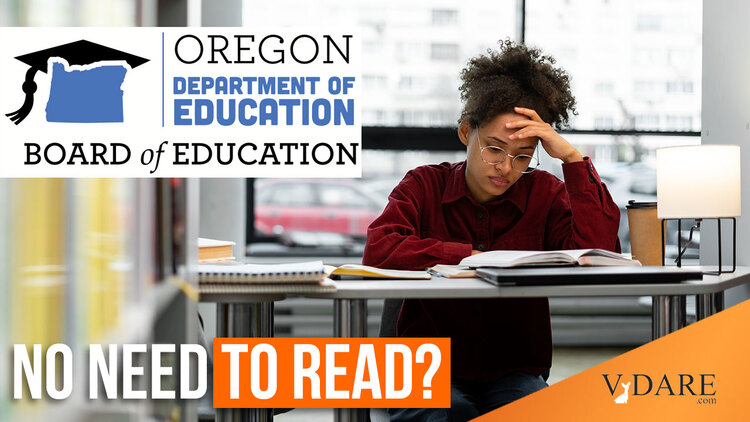
Intelligence Vs. Effort In Oregon
By Steve Sailer
10/20/2023
From The Oregonian:
Updated: Oct. 19, 2023, 10:23 p.m.|Published: Oct. 19, 2023, 6:16 p.m.
By Sami Edge | The Oregonian/OregonLive
Oregon high school students won’t have to prove basic mastery of reading, writing or math to graduate from high school until at least 2029, the state Board of Education decided unanimously on Thursday, extending the pause on the controversial graduation requirement that began in 2020. …
Opponents argued that pausing the requirement devalues an Oregon diploma. Giving students with low academic skills extra instruction in writing and math, which most high schools did in response to the graduation rules, helped them, they have argued.
But leaders at the Oregon Department of Education and members of the state school board said requiring all students to pass one of several standardized tests or create an in-depth assignment their teacher judged as meeting state standards was a harmful hurdle for historically marginalized students, a misuse of state tests and did not translate to meaningful improvements in students’ post high school success.
Higher rates of students of color, students learning English as a second language and students with disabilities ended up having to take intensive senior-year writing and math classes to prove they deserved a diploma. That denied those students the opportunity to take an elective, despite the lack of evidence the extra academic work helped them in the workplace or at college, they said.
…Proving mastery of reading, writing and math on one of many standardized tests or a teacher-judged in-depth assignment was one of several Oregon graduation requirements. Students also have to earn a prescribed number of credits and complete an education plan that maps out how they can achieve post high-school goals.
By the way, you may recall reading last summer that Oregon’s National Assessment of Educational Progress scores have plummeted. But that apparently had something to do with only students getting free or reduced price lunches taking the NAEP in Oregon in the last go-round.
During the pandemic, Gov. Kate Brown signed a bill freezing the proficiency requirement, as standardized tests weren’t happening amid school closures. Lawmakers decided to order a more comprehensive review of graduation requirements.
After broad outreach to families, educators, students and employers, with a particular focus on people of color, the Oregon Department of Education recommended new graduation recommendations about a year ago. One of those was to scrap the requirement to show mastery of reading, writing and math. State lawmakers have not acted on that recommendation, and the department in the meantime asked the state board to continue its pause through at least the 2027-28 school year.
Speaking of the academic mastery requirements, Dan Farley, assistant superintendent of research and data for the department, told the state board Thursday, “They did not work. What they were designed to do is protect student interests. We have no evidence that they did that.”
Farley pointed to a 2021 analysis by Oregon’s Higher Education Coordinating Commission that found no clear evidence that implementing the proficiency standards improved the performance of Oregon high school graduates during their first year of community college or university classes.
In other words, people who aren’t bright enough and/or hard working enough to get a high school education are even less cut out for college education.
The report also notes that it’s possible that the level of skill required to meet Oregon’s since-paused academic mastery standards was “too low to improve college and university outcomes.” …
Whitney Grubbs, executive director for Foundations for a Better Oregon, a coalition a coalition of Oregon-based nonprofits that advocates for educational equity among other school reforms, wrote in public testimony that pausing or ending graduation requirements without proposing more effective and equitable alternatives “risks leading Oregonians to believe that our state is lowering expectations to artificially mask disparities” and reinforces false and prejudiced ideas that students’ demographics dictate their academic success.
“As Oregonians, we hold high expectations for students because we believe in the boundless potential of children,” Grubbs’ testimony said.
But what if the potential of children tends to be bounded?
OK, my guess is that there are two main factors in determining whether a student learns the basics in high school: innate intelligence and work ethic. The first one is tough to change, the second one less so.
I can see an aversion to punishing students just for being born with low intelligence. (I’ve suggested in the past the possibility of an Associate’s high school diploma, rather like what junior college graduates get as a possibility.)
On the other hand, trying to minimize punishment of the less bright can hurt the inculcation of a good worth ethic.
It seems like data analysts should be trying to figure out the best tradeoff between the two factors. Probably the average major league baseball team alone has enough quantitative analytical firepower in its front office to take on this challenge, but I seldom see anybody try it with public schools because A) the race thing, B) the “boundless potential” wishful thinking.
